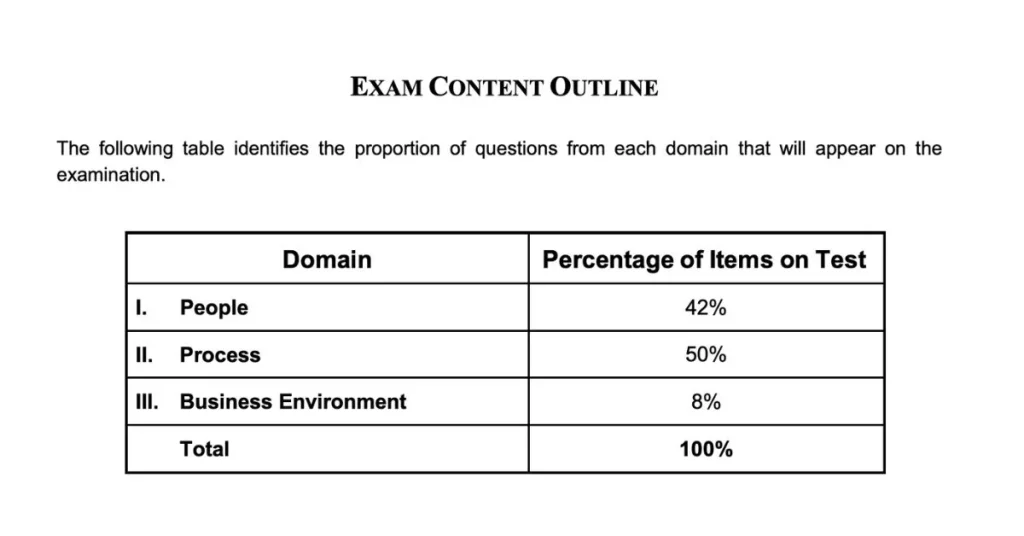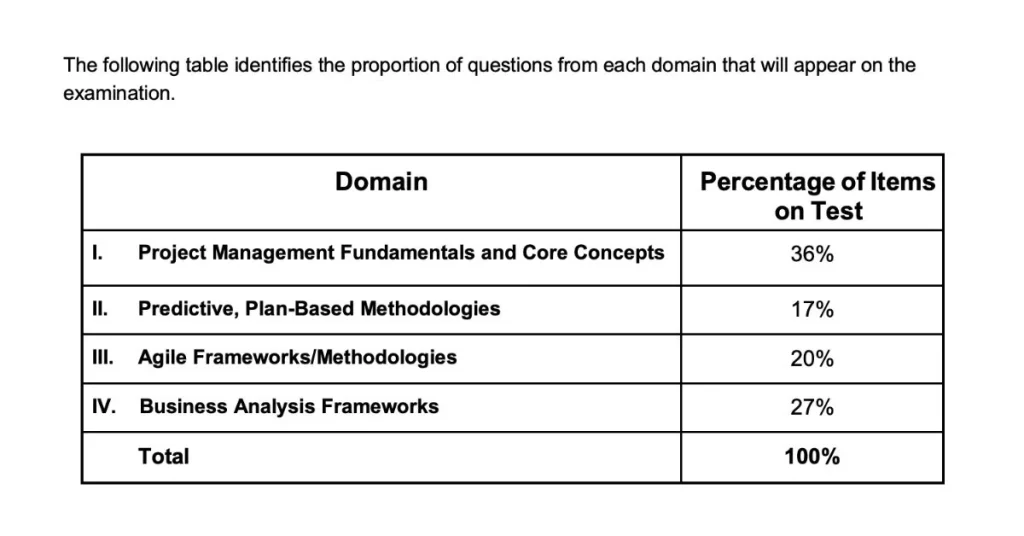BUSINESS
What is the difference between PMP and CAPM?

Both the PMP certification and CAPM are popular certifications offered by PMI, each with its own separate requirements. The PMP is designed for seasoned project managers or individuals with some project management experience. Conversely, the CAPM is intended for recent college graduates or those who may not meet the eligibility criteria for the PMP certification due to a lack of formal project management experience.
In this blog post, I will outline some key differences between the PMP and CAPM certifications. Additionally, I’ll help you determine which certification exam aligns best with your work experience to enhance your project management career.
What are the requirements for the PMP certification?
PMP, or the Project Management Professional certification, is a generic certification that can be pursued by individuals from any background. It is not industry-specific and can be obtained by professionals working in a wide range of industries, including manufacturing, IT, finance, marketing, insurance, healthcare, and others. All you need to do to attain the PMP is to have work experience specifically in project management, which you will need to demonstrate to PMI.
Here are the requirements/pre-requisites for the PMP below:
- If you have a Bachelor’s Degree, you need to show at least 36 months of project management experience with 35 hours of project management education.
OR
- If you only have a High School Diploma or an Associate’s Degree, then you need to show 60 months of project management experience along with 35 hours of project management education.
You will need to demonstrate your project management experience to PMI by completing a PMP application. You can learn more about how to capture your experience using these PMP experience examples for the application.
You can take an online PMP training course, and the training provider will provide you with the 35 contact hours certificate required to apply for the PMP.
What are the prerequisites for the CAPM certification?
As mentioned earlier, the CAPM certification is designed for individuals without any project management experience or for those who are just starting their careers.
To get the CAPM certification, you need to:
- Have a secondary degree, such as a high school diploma, GED (general educational development), or global equivalent
- Have at least 23 hours of project management education completed before the exam
If you have your high school certificate and the certificate for the 23 hours of project management education, you can go ahead and apply for the CAPM certification.
The training provider will provide you with the 23 contact hours certificate once you complete their course.
What is tested in the PMP Exam vs. the CAPM exam?
Both PMP and CAPM certification exams test you on project management concepts, but their focus areas are slightly different, and the difficulty levels of the exams differ as well. The PMP exam is considered to be more challenging than the CAPM exam since it tests the application of knowledge acquired while studying for the PMP. Many PMP exam questions are situational, and the answers are not straightforward. You will need to apply your critical thinking abilities to answer PMP test questions.
Here is what the PMP exam tests you on:

Since the PMP has three domains, I have provided you with a high-level understanding of what is tested in each of these domains:
- The People domain is predominantly associated with managing conflict, leading teams, communicating with stakeholders, engaging and supporting virtual and physical teams, and so on. Therefore, this section will test your knowledge of the people side of project management.
- The Process domain is associated with testing you on all the technical elements of managing a project, such as planning, executing, and managing aspects such as cost, quality, scope, schedule, change, integration, risk, resources, procurement, and communication.
- The Business Environment domain tests on planning and managing project compliance, delivering project benefits and value, management of project strategy, and a few other related concepts.
The CAPM exam tests you in the following areas, as you can see below.

The CAPM exam questions are more straightforward compared to the PMP, making the exam easier in comparison. However, even the CAPM exam has become more situational than before, testing understanding concepts rather than relying solely on bookish definitions and rote memorization. I hope that by now, you have a better understanding of the difference between the CAPM and the PMP and which one you might want to choose based on your experience and career goals. In general, the PMP is for people eyeing mid- to senior-level project manager roles, while the CAPM is for beginner project managers or coordinators.
APPS & SOFTWARE
How To Manage Employees at Scale: Workforce Management Software

Companies that maintain a clear record of employee time, attendance, and tasks may experience boosted performance and improved bottom lines. Workforce management software enables labor-intensive organizations to maximize labor efficiency, minimize compliance risks, and develop strategic insight that improves business operations. Embracing a data-driven approach to management helps companies retain talent, cut labor costs, and adhere to labor laws. Here are a few ways workforce software can help you manage employees at scale:
Improved Labor Optimization
Management software identifies and alerts management to labor issues such as overstaffing or understaffing based on forecasted workloads. Workforce management software analyses historical data and business trends to align staff schedules with anticipated demand. It factors employee availabilities, skills, and preferences to generate optimized schedules that result in better timekeeping and adherence to deadlines. Businesses may experience reduced scheduling errors, optimized workforce utilization, smoother shift planning, and improved employee satisfaction due to fair and balanced schedules. Labor optimization increases productivity and success rates as each task is assigned and complies with the company’s workflow.
Enhanced Demand Forecasting
Accurately forecasting demand for a large and dispersed workforce, including remote employees, can present significant growth and operational efficiency opportunities. Miscalculated labor requirements lead to inefficient staffing that strains the budget and interferes with performance. A workforce management system uses artificial intelligence algorithms to predict workload volume for active operation days. The forecasted data can help management make informed decisions on when to increase or scale down the workforce. The software uses repeated data patterns to forecast future requirements, helping businesses to have better budget and resource allocation planning.
Automated Scheduling
Manual schedule creation is time-consuming for a large workforce, especially when different shifts and employee skills are involved. Workforce management systems are automated and generate schedules that align with forecasted demand, employee availability, and skill sets. Such systems allow for easy updating and making changes to the schedule. A workforce management tool features workforce sharing, smart templates, and shift swapping. It will enable staff to pick up open shifts or make changes that a supervisor approves. Automated scheduling streamlines administrative tasks and promotes equitable distribution of shifts.
Improved Time Tracking and Attendance
Employee attendance and time tracking help calculate the number of hours worked, overtime, and absences. Managing data tracking manually for a large workforce can pose challenges in terms of time consumption, error risks, and complexity. Workforce management software provides a more efficient solution by automating the time-tracking process. Employees clock in and out using their devices, eliminating discrepancies or manual calculations. This feature also helps managers better understand their employees’ productivity and identify any issues that may arise.
Improved Compliance and Reporting
Compliance with labor laws and regulations is a requirement for any organization. The laws stipulate maximum working hours, minimum wage, and overtime pay. Employees are entitled to rest, meal breaks, and a set number of vacation days. A workforce software ushers in automation and standardization, promoting law adherence. The software also generates comprehensive reports on employee data. The report makes it easier for organizations to monitor compliance and identify any areas of improvement. These reports can also aid in identifying trends and patterns within the workforce, enabling organizations to make proactive changes.
Enhanced Employee Engagement
Features in a workforce management system, including newsfeeds, polls, surveys, and scheduling communications, support effective information sharing across the organization. Highly engaged employees are more productive, have lower absenteeism rates, and stay with the company longer. Workforce management tools improve employee engagement in various ways. The software allows employees to view their schedules and adjust as needed, promoting transparency and control over their work hours. It provides a platform for employees to request time off, swap shifts with colleagues, and communicate with managers. This level of autonomy and communication fosters a sense of ownership and teamwork among employees. The software can track employee performance and provide top performers, further boosting engagement levels.
Maximize Efficiency With Workforce Management Software
Effective communication improves workplace efficiency and reduces errors. Workforce management software allows for streamlined communication between employees, managers, and HR personnel. The software sends automated notifications, reminders, and updates to keep everyone on the same page. It also provides a centralized platform for all employee information, eliminating the need for multiple manual systems. Investing in workforce software may lead to significant cost savings and improve organizational success. Implement workforce software into your business processes today.
BUSINESS
Creative Ways to Reuse and Recycle Takeaway Containers

Have you ever pondered over what to do with the masses of takeaway containers that end up filling our dustbins weekly? Due to their convenience and durability, countless containers find their way into our homes, usually tossed out without a second thought. However, with a touch of creativity and a concern for the environment, these often neglected items can be granted a second lease of life. This blog will provide you with innovative ideas to recycle and reuse takeaway containers.
1. Artful Planters
Why not transform takeaway containers into chic planters for your houseplants or your kitchen garden? Drill some holes at the bottom for drainage and get your green thumb working. They can support herbs, succulents, or a splash of floral beauty right at your windowsill.
2. Craft Supplies Storage
Takeaway containers make excellent storage options for art and craft supplies. Sort out your buttons, beads, sequins, paintbrushes, and numerous other craft essentials. They will be readily available when you need them, and your work area will remain clutter-free.
3. Homemade Candles
A fantastic way to reuse plastic or aluminium containers is by turning them into candle moulds. Not only will you be crafting beautiful homemade candles, but also contributing towards reducing plastic pollution.
4. Versatile Organisers
Declutter your workspace, vanity, or even your garage by using these handy containers as organisers. They can hold everything – from nails and screws to makeup and jewellery, ensuring that everything is always within your arm’s reach.
5. Seed Starters
One of the easiest ways to reuse plastic containers is to use them as seed starters. Poke some holes at the bottom, fill with potting mix, and start your seedlings. Once they’re ready to be transplanted, you can reuse the container a win-win situation for you and the environment.
6. Leftovers Best Friend
Think twice before you ditch that sturdy takeaway container – it can be a lifesaver for storing leftovers. It’s worth mentioning that they should be cleaned thoroughly and dried before using them for food storage again.
In Conclusion
Demonstrating creativity with takeaway containers not only helps to lower the volume of waste that we contribute to the environment but can also serve practical purposes around your home too. Next time, remember that these containers are way more than just a one or two-time food carrier. They are a valuable, reusable resource, and their possible applications are as extensive as your imagination permits. The key takeaway here is to ingenuity and transform what’s typically considered as trash into an example of smart recycling. So, let’s brace ourselves to gift our beloved takeaway containers a new life and towards reduced waste and a healthier planet.
BUSINESS
Mastering Logistics: Unleashing the Potential of 3PL Warehouse Management Software for End-to-End Supply Chain Success

In today’s hyper-competitive global market, businesses face a daunting challenge: to not only meet but exceed customer expectations while navigating the intricate web of supply chain logistics. From sourcing raw materials to delivering finished products, the efficiency and effectiveness of every link in the supply chain can make all the difference between success and stagnation. Enter third-party logistics (3PL) warehouse management software, a dynamic solution empowering businesses to conquer the complexities of modern commerce with unparalleled agility, precision, and continuous evolution.
Unveiling the Imperative for Logistics Technology
In the relentless pursuit of operational excellence, businesses are embracing technology as their trusted ally. Nowhere is this more evident than in logistics management, where outdated methods have become obsolete in the face of evolving consumer demands and global market dynamics. Recognizing the imperative for transformation, companies are turning to advanced logistics technology, with 3PL warehouse management software emerging as the cornerstone of their strategic arsenal.
Unraveling the Boundless Advantages of 3PL Warehouse Management Software
- Unparalleled Visibility and Transparency: Harnessing the power of real-time data analytics, 3PL warehouse management software offers unparalleled visibility into every facet of the supply chain. From inventory tracking to shipment status updates, businesses gain unprecedented insights, enabling informed decision-making and proactive problem-solving. With customizable dashboards and interactive reporting tools, stakeholders can access critical information anytime, anywhere, ensuring transparency and accountability across the organization.
- Optimized Efficiency and Productivity: By automating manual processes and streamlining operations, 3PL warehouse management software drives unmatched efficiency and productivity gains. With features such as automated order fulfillment, dynamic inventory replenishment, and intelligent route optimization, businesses can minimize costs, reduce lead times, and maximize throughput with unparalleled precision. Moreover, advanced algorithms and machine learning capabilities empower businesses to optimize resource allocation, minimize bottlenecks, and enhance operational agility in the face of changing demand patterns and market dynamics.
- Scalability and Adaptability: In the dynamic landscape of modern commerce, scalability and adaptability are non-negotiable traits for success. 3PL warehouse management software offers businesses the flexibility to scale their operations seamlessly, whether expanding into new markets, launching new product lines, or adapting to seasonal fluctuations. With customizable workflows and adaptable configurations, businesses can future-proof their logistics strategies and stay ahead of the curve. Moreover, cloud-based deployment options and modular architectures ensure scalability without sacrificing performance, allowing businesses to grow and evolve without constraints.
- Cost Optimization and Resource Utilization: In an era defined by razor-thin margins and relentless competition, cost optimization is paramount. 3PL warehouse management software empowers businesses to identify cost-saving opportunities, from optimizing inventory levels and reducing excess stock to minimizing transportation expenses and labor costs. By leveraging predictive analytics and machine learning algorithms, companies can unlock hidden efficiencies, forecast demand with precision, and drive sustainable cost reductions across the supply chain. Furthermore, real-time cost tracking and financial analytics enable businesses to monitor expenses, identify cost drivers, and make data-driven decisions to enhance profitability and competitiveness.
- Enhanced Customer Experience: In an age where customer experience reigns supreme, 3PL warehouse management software enables businesses to deliver unparalleled service excellence. With features such as real-time order tracking, automated notifications, and seamless returns management, companies can exceed customer expectations at every touchpoint, fostering loyalty and driving repeat business. Moreover, personalized customer portals and self-service capabilities empower customers to track shipments, manage orders, and resolve issues independently, enhancing satisfaction and loyalty while reducing service overheads. By prioritizing customer-centricity and responsiveness, businesses can differentiate themselves in the market, build brand loyalty, and drive sustainable growth in the long term.
Charting the Course for Future Innovation
As technology continues to evolve at an unprecedented pace, the future of logistics management holds limitless possibilities. From harnessing the potential of artificial intelligence and machine learning to leveraging the Internet of Things (IoT) for enhanced connectivity, the journey towards supply chain optimization is one of endless innovation and discovery. Emerging technologies such as blockchain, robotics, and predictive analytics are reshaping the logistics landscape, offering unprecedented opportunities for optimization, automation, and value creation. By embracing a culture of innovation and collaboration, businesses can stay at the forefront of technological advancements, drive continuous improvement, and unlock new avenues for growth and competitiveness.
Conclusion: Setting Sail Towards Success
In conclusion, the transformative power of 3PL warehouse management software is reshaping the landscape of modern commerce, empowering businesses to navigate the supply chain seas with confidence, agility, and foresight. By unlocking unparalleled visibility, driving operational efficiency, and enhancing customer experiences, 3PL warehouse management software serves as a beacon of innovation in an increasingly competitive marketplace. As businesses chart their course towards success, investing in 3PL warehouse management software isn’t just a strategic choice—it’s a voyage towards unparalleled growth, resilience, and prosperity in the digital age and beyond.

 ENTERTAINMENT4 days ago
ENTERTAINMENT4 days agoExploring the Kristen Archives: A Treasure Trove of Erotica and More

 TECHNOLOGY4 months ago
TECHNOLOGY4 months agoBlog Arcy Art: Where Architecture Meets Art

 LIFESTYLE4 months ago
LIFESTYLE4 months agoThe Disciplinary Wives Club: Spanking for Love, Not Punishment

 ENTERTAINMENT1 day ago
ENTERTAINMENT1 day agoKiss KH: The Streaming Platform Redefining Digital Engagement and Cultural Currents

 EDUCATION1 day ago
EDUCATION1 day agoLingrohub Platform: A Complete Student Access Guide

 TECHNOLOGY1 day ago
TECHNOLOGY1 day agoCasibom: The Digital Alchemy Reshaping Systems, Society, and Self

 HEALTH1 day ago
HEALTH1 day agoThe Surprising Benefits of Weight Loss Peptides You Need to Know

 BUSINESS1 day ago
BUSINESS1 day agoDiversifying Your Portfolio: The Key to Successful Investing in Portland, Oregon










